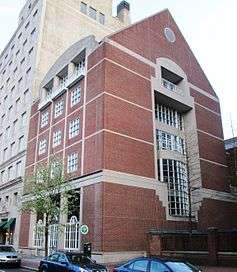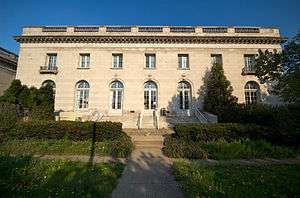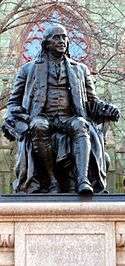Center for Advanced Judaic Studies
|
Dropsie University Complex | |
|
the original location of Dropsie University | |
   | |
| Location |
Broad and York Streets Philadelphia, Pennsylvania |
|---|---|
| Coordinates | Coordinates: 39°59′20.2632″N 75°9′19.0548″W / 39.988962000°N 75.155293000°W |
| Area | 2 acres (0.81 ha) |
| Built | 1909 |
| Architect | Lewis F. Pilcher & W.T. Tachau |
| Architectural style | Beaux Arts, Renaissance |
| NRHP Reference # | 75001661[1] |
| Added to NRHP | January 17, 1975 |
The Hebert D. Katz Center for Advanced Judaic Studies (CAJS or "the Katz Center"[2]) at the University of Pennsylvania is the world's first and only institution exclusively dedicated to post-doctoral research on Jewish Civilization.[3] It is located at 420 Walnut Street between S. 4th and S. 5th Streets in the Old City, Philadelphia neighborhood of Philadelphia. The center is directed by Professor David B. Ruderman.
History
Dropsie College
The institution now known as CAJS was founded in 1907 as the Dropsie College of Hebrew and Cognate Learning and finally as Dropsie University. It was named after its benefactor, Moses Aaron Dropsie (1821–1905),[4][5] a wealthy man whose father was Jewish and mother was Christian but who self-identified as Jewish from the age of 14. Dropsie willed his entire fortune to "the promotion of and instruction in the Hebrew and cognate languages and their respective literatures."
Dropsie granted more than 200 Ph.D.s between its inception and its closing as a degree-granting institution in 1986. Dropsie was also the publisher of the Jewish Quarterly Review, which was at the time the most respected journal on the subject.
The faculty during the Dropsie era included scholars from outside the United States, including Benzion Netanyahu, who came from Jerusalem with his young sons, Yonatan (Yoni) and Benjamin (Bibi), who there had their first true exposures to American culture, which would become a touchstone for later interactions with the American public for Bibi.[3]
Recent history
Although no longer a degree-granting college, it became the Annenberg Research Institute after its 1986 closing and turned into one of the country's most noted interdisciplinary post-doctoral fellowship programs. It merged with the University of Pennsylvania in 1993, after which the institution was renamed the Center for Advanced Judaic Studies. It continues to publish the Jewish Quarterly Review, the oldest continuously published Judaic studies journal in English.
Fellowships
Today, CAJS supports approximately 24 fellows each year who conduct their research at the University of Pennsylvania. Each fellow is given their own downtown Philadelphia office and meets with the others at weekly seminars. The papers they produce are published by the University of Pennsylvania Press at the conclusion of their term in the program.
Each year has a specific theme; scholars apply if their current research fits the annual theme. For example, for the 2005-2006 academic year, the theme was "The Jewish Book: Materials Texts and Comparative Contexts." For 2006-2007, fellows studied "Jewish, Christian, and Muslim Life under Caliphs and Sultans."
Library
The combination of the Dropsie/Annenberg library along with the University of Pennsylvania's resulted in a 350,000-volume collection on Judaica, including more than 8,000 rare books and an assortment of cuneiform tablets. Texts are available to scholars in Hebrew, English, German, Yiddish, Ladino, Arabic, and Latin.[6]
There are also 451 codices in eleven alphabets and 24 languages and dialects. Some of the languages and dialects represented, in addition to those already listed, include Judeo-Arabic, Armenian, Telugu, and Syriac. Fragments from the Cairo Genizah and others written in Coptic and Demotic on papyrus round out the collection.[6]
The library also holds the personal letters of more than 50 Jewish-American leaders from the 1800s and 1900s, including Isaac Leeser, Sabato Morais, & Abraham Neuman (three ministers of Congregation Mikveh Israel (Philadelphia)), Cyrus Adler (president: Dropsie College, Mikveh Israel, American Jewish Committee, Jewish Theological Seminary of America, librarian: Smithsonian Institution), Charles Cohen (president: Mikveh Israel, Fairmount Park Commission), his journalist sister Mary M. Cohen, Yiddish journalist Ben Zion Goldberg, and the benefactor Dropsie.[6]

Notable people
Many notable people in Judaic studies have been affiliated with CAJS or Dropsie in some capacity. Some include:
Dropsie College students
- Philip Birnbaum (1904–1988), Polish-American author and translator, best known for his translation of the siddur
- Raymond B. Dillard (1944–1993), American Old Testament scholar
- Iris Habib Elmasry (1910–1994), Coptic historian and scholar
- Ronald F. Youngblood (1931-2014), American biblical scholar and Professor of Old Testament
- Cyrus H. Gordon (1908–2001), Near East scholar - did not graduate
- R. Laird Harris (1911–2008), American Presbyterian minister and Old Testament scholar
- Louis L. Kaplan (1902-2001), President of Baltimore Hebrew University 1930-1970, Acting Chancellor of the University of Maryland, Baltimore County 1976-1977
- Meredith G. Kline (1922–2007), American theologian and Old Testament scholar – Ph.D. in Assyriology and Egyptology
- Samuel Noah Kramer (1897–1990), Ukrainian-American Assyriologist and Sumeriologist – did not graduate; transferred to Penn
- Albert L. Lewis (1917–2008), Congregational rabbi and professor of homiletics at the Jewish Theological Seminary of America
- Benzion Netanyahu (1910-2012), Zionist, scholar of Jewish history, and father of Israeli Prime Minister Benjamin Netanyahu
- Bernard Revel (1885–1940), future head of RIETS yeshiva and founder/President of Yeshiva College. 1911 doctoral thesis on Karaite Judaism
- Ephraim Speiser (1902-1965) Near East scholar and archaeologist, excavator of Tepe Gawra
- Edward J. Young (1907–1968), American Old Testament scholar and commentator
Dropsie College faculty
- Cyrus Adler, Jewish religious leader and scholar - president
- William Chomsky, noted Hebrew scholar and father of Noam Chomsky
- Benzion Netanyahu, historian of Jews in medieval Spain and father of Binyamin Netanyahu and Yonatan Netanyahu
- Raphael Patai, ethnographer and anthropologist - professor of anthropology, 1948–1957
- Stefan Reif, Jewish researcher - assistant professor of Hebrew, 1972–1973
- Solomon Zeitlin, historian of the second Jewish commonwealth and early Christianity.
See also
 Philadelphia portal
Philadelphia portal
References
Notes
- ↑ National Park Service (2007-01-23). "National Register Information System". National Register of Historic Places. National Park Service.
- ↑ Freidenreich, David M.; Goldstein, Miriam, eds. (2011). Beyond Religious Borders: Interaction and Intellectual Exchange in the Medieval Islamic World. University of Pennsylvania Press. p. 223. ISBN 9780812206913.
- 1 2 Moyer, Justin (March 3, 2015). "Why Benjamin Netanyahu is so tough: He's from Philadelphia". The Washington Post. Archived from the original on March 5, 2015. Retrieved March 5, 2015.
Few are aware that Israel’s prime minister — due to address Congress in a historic joint session today — spent four years in the City of Brotherly Love as a teenager. Netanyahu’s father Benzion moved from Israel to Cheltenham, Pa., in 1963 to teach at Dropsie College, America’s first center for post-doctoral Jewish studies, now the Katz Center for Advanced Judaic Studies at the University of Pennsylvania. With Benzion came his children, including Yonathan and his younger brother “Bibi,” the future prime minister.
- ↑ "Dropsie, Moses Aaron" The Jewish Encyclopedia website]
- ↑ "Dropsie, Moses Aaron" Encyclopedia.com website
- 1 2 3 Kiron, Arthur (2000). "The Professionalization of Wisdom: The Legacy of Dropsie College and Its Library" (PDF). University of Pennsylvania. p. 20.
Bibliography
- "Fellowship Program". University of Pennsylvania: Center for Advanced Judaic Studies. Accessed June 9, 2006.
- "History of CAJS". University of Pennsylvania: Center for Advanced Judaic Studies. Accessed June 9, 2006.
- "Past Fellows". University of Pennsylvania: Center for Advanced Judaic Studies. Accessed June 9, 2006.
- Kiron, Arthur. "The Legacy of Dropsie College and Its Library". The Penn Library Collections at 250.
- Stuhlman, Daniel D. "American Judaica Collections". Librarian's Lobby. December 2001.
External links
- Herbert D. Katz Center for Advanced Judaic Studies
- Center for Advanced Judaic Studies Library
- Center for Advanced Judaic Studies Library Exhibitions
- Penn Library Collections at 250: Jewish Studies



